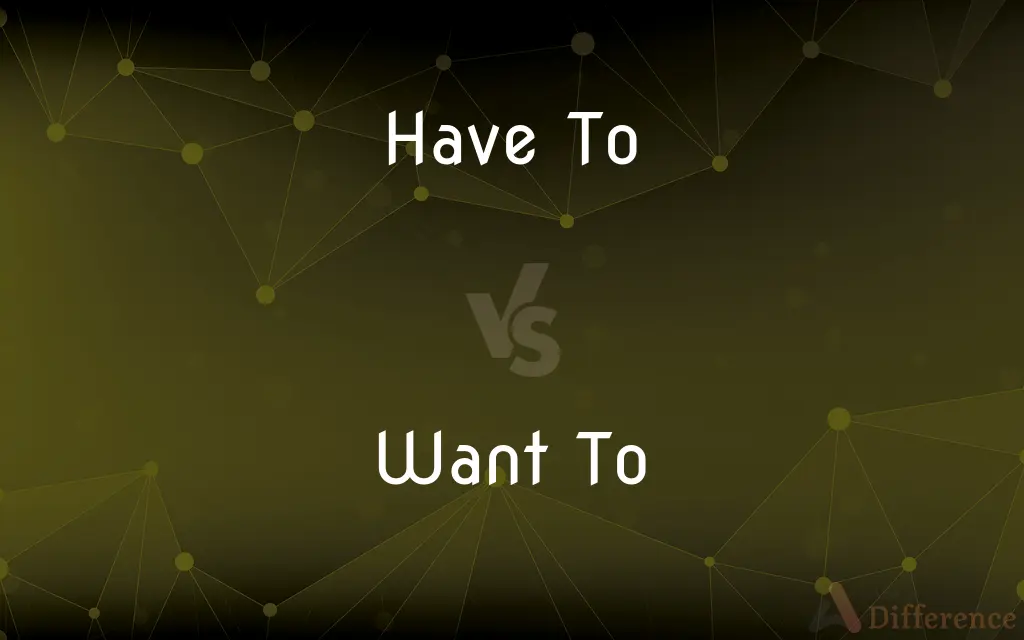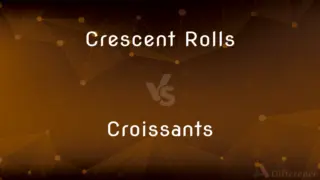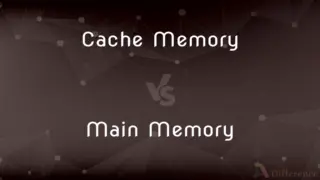Have To vs. Want To — What's the Difference?
By Tayyaba Rehman — Published on November 23, 2023
"Have To" indicates obligation or necessity, while "Want To" expresses desire or willingness.

Difference Between Have To and Want To
Table of Contents
ADVERTISEMENT
Key Differences
"Have To" is a phrase that denotes an obligation or a need to perform a particular action. On the other hand, "Want To" signifies a desire or a personal preference to do something.
While "Have To" implies that there's a compelling reason behind the action, whether external or internal, "Want To" reflects a personal choice or inclination. For example, you might "have to" go to a doctor due to illness, but you "want to" go to a concert because you enjoy the music.
The implications of using "Have To" suggest that there might be consequences for not undertaking the action. In contrast, "Want To" carries no such implications, as it's driven by personal wish or desire. One might "have to" pay taxes to avoid legal consequences, whereas they might "want to" buy a new book purely for enjoyment.
In daily life, these phrases help us differentiate between our duties and our desires. "Have To" often relates to responsibilities, whether societal, familial, or professional. Meanwhile, "Want To" is tied to our hobbies, passions, and things we choose to do for pleasure or personal benefit.
Both "Have To" and "Want To" are essential in expressing our motivations and reasons behind actions. Recognizing the difference helps us prioritize tasks based on obligation versus personal choice.
ADVERTISEMENT
Comparison Chart
Indicates
Obligation or necessity.
Desire or willingness.
Implication
There might be consequences for not doing it.
No particular consequences, driven by choice.
Typical Usage
Tasks, responsibilities, mandates.
Hobbies, passions, personal preferences.
Tone
Compulsory.
Voluntary.
Emotional Association
Can be associated with pressure or duty.
Usually associated with personal joy or preference.
Compare with Definitions
Have To
"Have To" suggests a mandatory task.
We have to attend the meeting tomorrow.
Want To
"Want To" shows a desire.
I want to travel the world.
Have To
"Have To" indicates a compulsion.
He has to take his medication daily.
Want To
"Want To" denotes a wish.
They want to visit their grandparents.
Have To
"Have To" denotes a required action.
You have to wear a seatbelt while driving.
Want To
"Want To" expresses an inclination.
She wants to learn to play the guitar.
Have To
"Have To" implies an obligation.
I have to finish my homework.
Want To
"Want To" indicates a preference.
He wants to watch the movie tonight.
Have To
"Have To" signals a necessity.
She has to get groceries today.
Want To
"Want To" signifies a voluntary choice.
We want to donate to the charity.
Want To
(informal) Intention, desire.
Common Curiosities
Can "Have To" and "Want To" be used interchangeably?
Generally no, as they convey different motivations for actions.
What's the key difference between the two?
"Have To" is about obligation, while "Want To" is about choice.
Why might someone use "Have To"?
To indicate that an action is mandatory or required.
Can "Want To" imply need?
Not typically. It's more about personal desire.
What does "Have To" signify?
"Have To" indicates an obligation or necessity.
Is "Have To" always about external pressure?
No, it can be an internal feeling of duty or responsibility.
How is "Want To" used in everyday speech?
It's used to express personal preferences or desires.
Can "Have To" relate to personal goals?
Yes, if someone feels a personal obligation toward a goal.
Is "Want To" about obligation?
No, "Want To" expresses a personal desire or choice.
Can I say "I want to do my homework"?
Yes, it means you have a desire to do your homework.
Which phrase is more voluntary?
"Want To" is voluntary, based on personal choice.
Is "Want To" more positive?
It's often seen that way, as it's tied to personal desires.
In terms of urgency, which has more?
"Have To" typically carries more urgency due to its obligatory nature.
Does "Have To" imply liking the task?
Not necessarily. It just means it's necessary.
Which phrase is more about personal feelings?
"Want To" is more tied to personal feelings and choices.
Share Your Discovery

Previous Comparison
Crescent Rolls vs. Croissants
Next Comparison
Cache Memory vs. Main MemoryAuthor Spotlight
Written by
Tayyaba RehmanTayyaba Rehman is a distinguished writer, currently serving as a primary contributor to askdifference.com. As a researcher in semantics and etymology, Tayyaba's passion for the complexity of languages and their distinctions has found a perfect home on the platform. Tayyaba delves into the intricacies of language, distinguishing between commonly confused words and phrases, thereby providing clarity for readers worldwide.












































